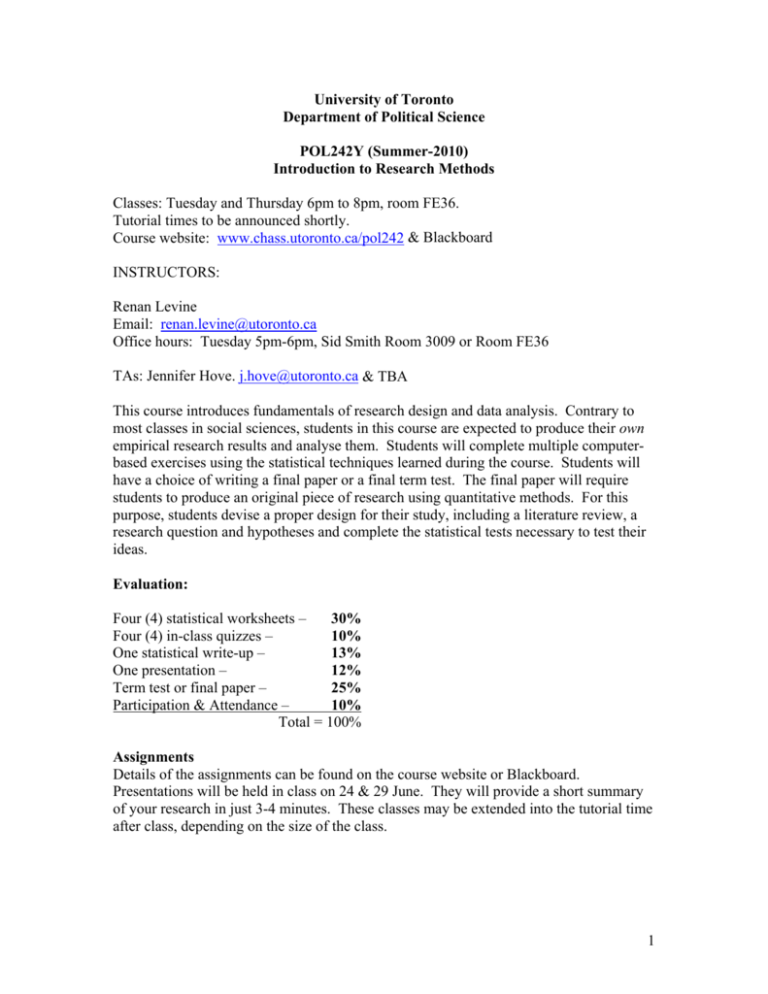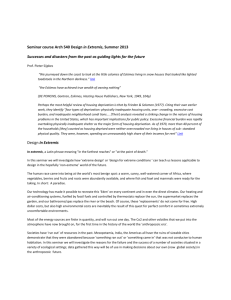
University of Toronto
Department of Political Science
POL242Y (Summer-2010)
Introduction to Research Methods
Classes: Tuesday and Thursday 6pm to 8pm, room FE36.
Tutorial times to be announced shortly.
Course website: www.chass.utoronto.ca/pol242 & Blackboard
INSTRUCTORS:
Renan Levine
Email: renan.levine@utoronto.ca
Office hours: Tuesday 5pm-6pm, Sid Smith Room 3009 or Room FE36
TAs: Jennifer Hove. j.hove@utoronto.ca & TBA
This course introduces fundamentals of research design and data analysis. Contrary to
most classes in social sciences, students in this course are expected to produce their own
empirical research results and analyse them. Students will complete multiple computerbased exercises using the statistical techniques learned during the course. Students will
have a choice of writing a final paper or a final term test. The final paper will require
students to produce an original piece of research using quantitative methods. For this
purpose, students devise a proper design for their study, including a literature review, a
research question and hypotheses and complete the statistical tests necessary to test their
ideas.
Evaluation:
Four (4) statistical worksheets –
30%
Four (4) in-class quizzes –
10%
One statistical write-up –
13%
One presentation –
12%
Term test or final paper –
25%
Participation & Attendance –
10%
Total = 100%
Assignments
Details of the assignments can be found on the course website or Blackboard.
Presentations will be held in class on 24 & 29 June. They will provide a short summary
of your research in just 3-4 minutes. These classes may be extended into the tutorial time
after class, depending on the size of the class.
1
Grading Policy
Assignments should be turned in at the start of the class on their due date. Late
assignments should be turned in to the Department of Political Science during business
hours. All matters of grading, exemptions, and discipline procedures will be handled in
accordance with the Faculty of Arts and Science Academic Handbook. All appeals and
complaints will be handled in a manner consistent with the regulations described in the
handbook. See http://www.artsandscience.utoronto.ca/studentaffairs/handbook.shtml for
the complete handbook.
Extensions for non-health reasons may only be granted prior to the day of the deadline,
exam or quiz by an instructor. Late assignments will be penalized 3% per day for the first
ten days of lateness. Each day ends at 5 pm. After ten days of lateness, the teaching
assistants and the instructor will refuse to accept the work for grading.
Any student who believes that any work has been unfairly graded may ask the instructor
to re-evaluate his or her work. Grading appeals should be submitted with a cover letter
explaining the basis of the appeal to the instructor or the teaching assistant. No oral or
emailed appeals will be considered. Such re-marking may involve the entire piece of
work, and may raise or lower the mark.
Plagiarism – turnitin.com
Plagiarism is a serious academic offense with a severe penalty. It is essential that you
understand what plagiarism is and that you do not commit it. Please see
http://www.utoronto.ca/writing/plagsep.html for more information and tips on how to
avoid plagiarism. Students agree that by taking this course all required papers and writeups must be submitted for textual similarity review to Turnitin.com for the detection of
plagiarism. All submitted papers will be included as source documents in the
Turnitin.com reference database solely for the purpose of detecting plagiarism of such
papers. The terms that apply to the University's use of the Turnitin.com service are
described on the Turnitin.com web site.
Collaborative Work
During class, especially during laboratory activities, you will be encouraged to
collaborate and work with your classmates. All work turned in for a grade, though, must
be the product of your individual efforts unless you have prior permission from an
instructor to work collaboratively.
Tutorials
All tutorials are held in the classroom FE 36. Tutorials are an essential part of POL242.
Tutorials provide an opportunity to complete work for class with the assistance of the
teaching assistants. While attending tutorials is not mandatory, it is very strongly
suggested. Because of the highly technical nature of the course, students typically do
perform much better if they attend tutorials.
Required Readings:
Pollock, Phillip. “The Essentials of Political Analysis.” CQ Press, 3rd Edition.
2
Various data exercises found on http://chass.utoronto.ca/pol242
Other required readings marked ONLINE are available electronically through the
University of Toronto Library catalogue. Those not ONLINE will be made available
through Blackboard.
Recommended Readings:
Some readings or alternative readings listed below in the syllabus are drawn from:
Paul M. Kellstedt & Guy Whitten, The Fundamentals of Political Science Research,
Cambridge University Press, 2009. ISBN: 978-0-521-69788-0;
Jarol B. Manheim, Richard Rich, Lars Willnat and Craig Leonard Brians, Empirical
Political Analysis: Research Methods in Political Science, 8th edition (Pearson Longman,
2010).
Michael Haan, An Introduction to Statistics for Canadian Social Scientists, (Oxford,
2009).
These books have different strengths and have been required in the past for this course.
You may choose to use any of these books for this course instead of the Pollock text.
Other readings are available on-line through archives like JStor.
Students are also advised to consult the following on-line textbooks which have also been
used in previous years for the course.
Wolfgang Ludwig-Mayerhofer, Internet Guide to SPSS for Windows
http://www.lrz-muenchen.de/~wlm/wlmspss.htm
John L. Korey, Politically-Oriented Web-Enhanced Research Methods for
Undergraduates — Topics and Tools as adapted from:
http://www.csupomona.edu/%7Ejlkorey/POWERMUTT/index.html
Lee G. Burchinal, Methods for Social Researchers in Developing Countries
http://srmdc.net/
More recommended readings on statistics, graphics, technical writing and presentations
can be found at: http://www.chass.utoronto.ca/pol242/rec_readings.htm
Class Schedule:
Tuesday May 11 – Introduction: What is Social (Scientific) Research?
Readings: Pollock, Ch. 1, Haan (1 & 2); Manheim et al (1 & 2)
Thursday, May 13 – Univariate Comparisons and Webstats
3
Readings: Pollock, Ch. 2, Haan (3 & 6); Manheim et al. (16)
Lab exercise 1a
Tuesday, May 18 – Thinking in the language of Hypotheses and Variables
Readings: Pollock, Ch. 3, Haan (Review pp.10-11; 4 & 5); Manheim et al. (5)
Lab Exercise 2a & 2b
Thursday May 20 – Scientific Method and Probability
Pollock, Ch. 4
Univariate Worksheet due (7.5%)
Tuesday May 25 – Sampling and Significance
Readings: Pollock, Ch. 6, Haan (7 & 9); Manheim (7)
Thursday May 27 – T tests & ANOVA
Readings: Pollock, Ch. 7, Haan (10)
Lab exercises 5a & 5b
Tuesday June 1 – Crosstabs I
Readings: Pollock, Ch. 5, Haan (12 & 13)
Lab exercise 3a & 3b (& 5c)
Thursday June 3 – Crosstabs & Recoding
Quiz # 1: Crosstabs and variable types
Lab exercises from Tuesday, Lab 3c
Significance Worksheet due (7.5%)
Tuesday June 8 – Reliability Analysis and Indices
Readings: Manheim et al. (202-5); Babbie & Benaquisto (6);
Inglehart, R. and P. R. Abramson (1999) “Measuring Postmaterialism” American Political
Science Review. 93 (3): 665-677. ONLINE.
Lab exercise 4a & 4b
Thursday June 10 – Correlation; Making nice tables and graphs
Readings: Pollock, pp. 171-174, Haan (14); www2.chass.ncsu.edu/garson/pa765/correl.htm.
Lab exercise 6
Crosstab Worksheet due (7.5%)
Tuesday June 15 – Causality, Control and Elaboration
Readings: Pollock, Ch. 5, “The Elaboration Model” in Babbie, E. 2007. The Practice of Social
Research, 11th Ed.
Lab exercise 7
Quiz # 2: Bivariate Analysis (2.5%)
Thursday June 17 – Presentation Preparation
Lab exercise 7 if not completed on Tuesday, June 15
TBA
Tuesday June 22 – No Class
Thursday June 24 – No class
4
Tuesday June 29 –NO CLASS
Thursday July 1 – NO CLASS, Happy Canada Day
Tuesday July 6 – Presentations
Thursday July 8 – Presentations
Tuesday July 13 – – Introduction to Regression
Readings: Pollock, Ch. 8, Haan (16)
Lab exercise 8, 9a
Thursday July 15 – Multiple Regression & Dummies
Readings: Pollock, pp.184-187, Haan (p.134), Haan (18)
Lab exercise 9a
Tuesday July 20 – Dummy Variables & special regression in-class tutorial session
Quiz #3: Multiple Regression (2.5%)
Lab exercise 9b (1st part)
Thursday July 22 – Logistic Regression
Readings: Pollock, Ch. 9; Haan (17)
Lab exercise 10
Quiz #4: Logistic Regression (at end of class, 2.5%)
Regression Worksheet Due
Tuesday July 27 – Interactions
Pollock, pp. 187-189; TBA
Lab exercise 9b (continued)
Thursday July 29 – Regression Diagnostics
Regression Write-up (12%)
Tuesday August 3 – Literature Review, Referencing and Hypotheses [Revisited]
TBA
Thursday August 5 – Varieties of Qualitative Research & Causality Claims
Readings: B. Rothstein, 2007. “How to get at Causality in the Social Sciences: Multiple
Regression versus Case Studies,” Comparative Social Research, 24: 351-60. ONLINE.
TBA
TBA
Tuesday, August 10 – TBA
Thurday, August 12 – Final Report/ Term Test
5







